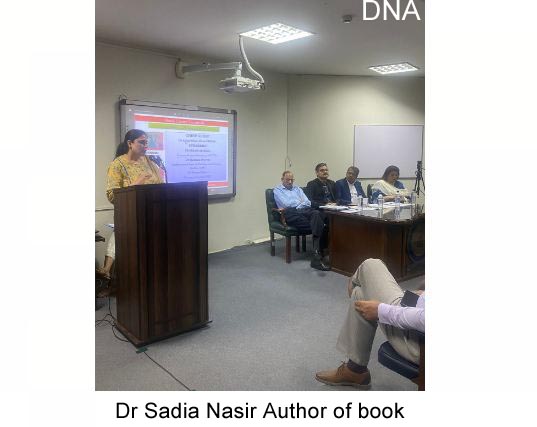DNA
ISLAMABAD, JUN 12: The book launch event of “Extremism and Counter-Extremism Narratives in Pakistan: An Analysis of Narrative Building” by Dr Sadia Nasir, was held by the Department of Humanities and Social Science department of Bahria University, Islamabad on 12 June 2023. Dr. Sadia Nasir, is an independent researcher and Adjunct Faculty Member at Bahria University. She holds PhD from Quaid-i-Azam University, Islamabad. She is a UNESCO/Keizo Obuchi research fellow and an RCSS Alumni.
Mr. Hamid Ali Khan, Former Federal Secretary and National Coordinator of NACTA, Dr Shabana Feyyaz, Chairperson DSS department, Quaid-e-Azam University and Mr.Hamza Ijaz, Program Manager at USIP, graced the occasion to evaluate and comment on the book as discussants. The event was well attended by the experts on the issue area, notable scholars, academicians, practitioners and students.
Former Federal Secretary Mr. Hamid Ali Khan praised the timely contribution and Pakistani perspective by the author. He mentioned that the author has provided a clear difference among various concepts such as extremism, radicalization, and terrorism. Which are often interchangeably used but have different connotations. Dr. Shabana Fayyaz while discussing the importance of the book mentioned that the author has used the primary sources to educate the reader about the importance of the construction of narratives and counter narratives in Pakistan and the role of madrassah. Mr. Hamza Ijaz appreciated the university for arranging and supporting the research work of Dr. Sadia. Dean Social Sciences (Bahria University) said that young generation is the future of Pakistan and exposed to social media. They should learn from such academic activities and need to be careful while taking information from social media.
The book has been recently published by Routledge; London and New York as part of its series on Routledge Studies in South Asian Politics, and is the first of its kind to analyse extremist narratives and counter-narratives, from different lenses at the same time. The book provides a reasoned and thoughtful analysis demonstrating the complexity of trying to build a meaningful counter-extremism narrative which is not detached from broader socio-political realities. It argues that counter-extremism narratives if they are to be successful in Pakistan, need to be taken out of an exclusive security-centric framework and focus on addressing social values and norms which form their basis. It highlights the construction and institutionalization of extremist tendencies and studies the process of the adoption of the narrow interpretation of religion and society, which subsequently was equated with national identity. It looks at the efforts of counter-extremism narratives, which tend to focus on violent extremism while overlooking non-violent manifestations. The author highlights that the main issue with counter-narratives is the difficulty in presenting extremism and its narratives as a social threat since they have been normalized with the state being part of facilitating and building them.
A valuable and much-required contribution to the existing literature on extremism and narrative building in Pakistan, this book would help students, academics and policymakers in identifying the limitations of counter-narratives in Pakistan, while providing them with a detailed overview of extremism and extremist narratives.

















